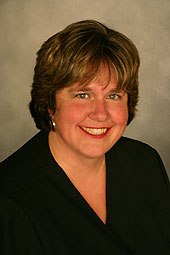October 10, 2005
Alumni profile: UCSC nurtured lawyer's commitment to social justice
By Jennifer McNulty
It seems now that Bonnie Rose Hough was destined for a career in law.

Bonnie Rose Hough, a Cowell College alumna, received her B.A. in American studies and community studies in 1983. |
One of the first classes she took at UCSC was Constitutional Law. During an internship her freshman year, she visited nursing homes to identify the legal needs of senior citizens and even represented them during administrative hearings on Social Security issues.
She worked with a local attorney on landlord-tenant law, and she interned for the ACLU in Mississippi, pitching in on death-penalty, prison-abuse, and first-amendment cases.
Today, Hough (pronounced "Huff") is a powerful advocate for Californians who are forced to represent themselves in court because they cannot afford a lawyer. (Unlike criminal court, civil court does not provide lawyers for the poor.) Her official title is supervising attorney for the Center for Families, Children & the Courts for the Judicial Council of California. Hough administers cutting-edge programs that provide guidance to people without lawyers as they navigate their way through the complex court system.
Hough recently received the Fay Stender Award from California Women Lawyers, the statewide women's bar association. The award is given annually to an attorney who is "committed to the representation of women, disadvantaged groups and unpopular causes, and whose courage, zest for life, and demonstrated ability to effect change as a single individual make her a role model for women attorneys."
William C. Vickrey, administrative director of the California Courts, called Hough a "state treasure" and said she is "living proof that one person can make a difference."
Hough has been working for social justice since college, when she reveled in the combination of classroom learning, experiential education, and analysis. After graduating with a double major in American studies and community studies, Hough earned a master's degree in public administration from San Francisco State University and then a law degree from Hastings College of the Law in 1987.
As a law student, she helped found the Family Law Center in Marin County, a private nonprofit organization that provides low-cost legal services to the poor. Often, it is the working poor who fall between the cracks, unable to afford a private attorney but ineligible for legal aid, said Hough, who became a staff attorney and executive director after graduation.
Though daunting, the prospect of appearing in court without an attorney is becoming commonplace. Eighty percent of the people who appear in family court in California each year have no legal representation, said Hough, now a supervising attorney with the Center for Families, Children & the Courts, an arm of the Administrative Office of the Courts (AOC) in San Francisco. Charged with improving the state court system, the AOC administers programs designed to improve the quality of justice in California.
Hough joined the AOC in 1997 to help launch the Family Law Facilitator Program, considered the backbone of the state's self-help court programs. Court-based self-help programs are staffed by attorneys who help people understand the law and gain access to the courts. The family law facilitator program provides an attorney in each of California's 58 counties to help self-represented litigants with child and spousal support issues. Many courts have expanded those services to assist with divorce, custody, and visitation issues.
The success of the facilitator program has spawned numerous programs, including the development of comprehensive self-help centers that provide assistance with landlord-tenant, consumer, and other issues, and offer services in Spanish and other languages. Hough has also spearheaded the development of a self-help web site with 900 pages of legal information and links to additional legal assistance.
Unlike other states, where judges might refuse entry to anyone without an attorney, California and Maryland are at the forefront of efforts to make their courts accessible to the poor.
"It's an amazing change in the judicial culture," said Hough. "We in California are so lucky to have a court system that cares enough to support this work. People can get to the court and can get their cases resolved."
Hough lives in Marin County with her husband, James Pfeiffer, and their dog Max, a border collie mix with "three legs and a very big heart."
Hough, a Cowell College alumna, received her B.A. in American studies and community studies in 1983.
 Email this story
Email this story
 Printer-friendly version
Printer-friendly version
 Return to Front Page
Return to Front Page